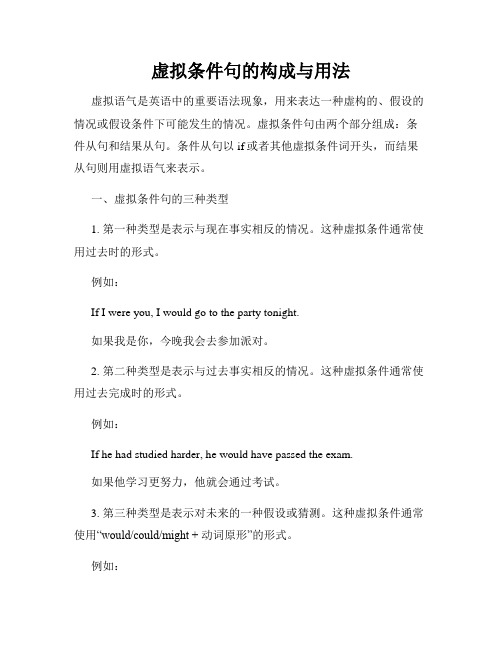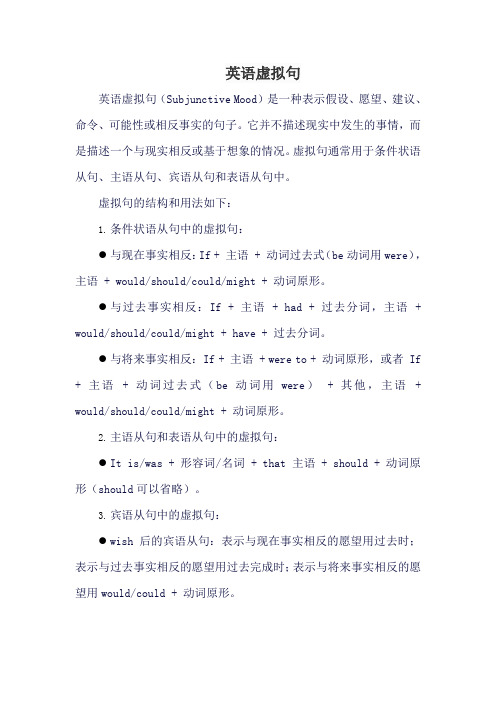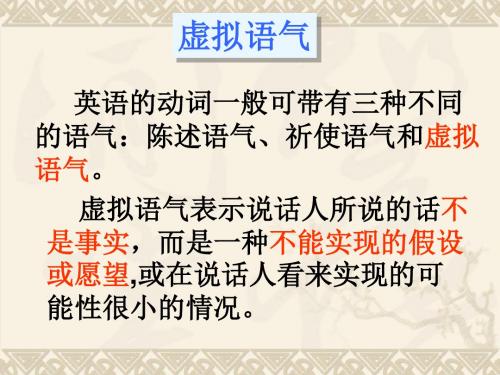虚拟条件句的用法
虚拟条件句的构成与用法

虚拟条件句的构成与用法虚拟语气是英语中的重要语法现象,用来表达一种虚构的、假设的情况或假设条件下可能发生的情况。
虚拟条件句由两个部分组成:条件从句和结果从句。
条件从句以if或者其他虚拟条件词开头,而结果从句则用虚拟语气来表示。
一、虚拟条件句的三种类型1. 第一种类型是表示与现在事实相反的情况。
这种虚拟条件通常使用过去时的形式。
例如:If I were you, I would go to the party tonight.如果我是你,今晚我会去参加派对。
2. 第二种类型是表示与过去事实相反的情况。
这种虚拟条件通常使用过去完成时的形式。
例如:If he had studied harder, he would have passed the exam.如果他学习更努力,他就会通过考试。
3. 第三种类型是表示对未来的一种假设或猜测。
这种虚拟条件通常使用“would/could/might + 动词原形”的形式。
例如:If it rains tomorrow, we will stay at home.如果明天下雨,我们就待在家里。
二、虚拟条件句的用法1. 表达建议:使用虚拟条件句可以用来提出建议或给予他人指导。
例如:If I were you, I would quit smoking.如果我是你,我会戒烟。
2. 表达祝愿:虚拟条件句常用于表达对他人的祝愿或希望。
例如:If only I had a chance to go on vacation!真希望我有机会去度假!3. 表达不可能实现的愿望:虚拟条件句也可以用来表达一种不可能实现的愿望或情况。
例如:If I had a million dollars, I would buy a yacht.如果我有一百万美元,我会买一艘游艇。
4. 表达对过去的惋惜:虚拟条件句还可以用来表达对过去情况的惋惜或后悔。
例如:If I had known the truth earlier, I would have acted differently.如果我早知道真相,我会采取不同的行动。
虚拟语气的be动词用法

虚拟语气的be动词用法
虚拟语气是指在表达一种假设、愿望、建议、命令等非现实情况时使用的一种语气,用来表达一种虚构的、与事实相反或不确定的情况。
在英语中,be动词在虚拟语气中的用法有以下几种:
1. 虚拟条件句中的be动词用法:
- If I were you, I would go.(如果我是你,我会去。
)
- If she were here, she would help us.(如果她在这里,她会帮助我们。
)
2. 虚拟愿望句中的be动词用法:
- I wish I were taller.(我希望我更高。
)
- She wishes she were a famous singer.(她希望自己是一位著名的歌手。
)
3. 虚拟建议句中的be动词用法:
- I suggest that he be more careful.(我建议他要更加小心。
)
- It is important that she be on time.(她准时到达很重要。
)
4. 虚拟命令句中的be动词用法:
- It is demanded that the documents be submitted immediately.(要求立即提交文件。
)
- The teacher insisted that the students be quiet.(老师坚持要求学生保持安静。
)
需要注意的是,虚拟语气的be动词在所有人称和时态中都是用were,而不是was。
这是一种固定的用法,并不依赖于主语的人称和时态。
英语虚拟句

英语虚拟句英语虚拟句(Subjunctive Mood)是一种表示假设、愿望、建议、命令、可能性或相反事实的句子。
它并不描述现实中发生的事情,而是描述一个与现实相反或基于想象的情况。
虚拟句通常用于条件状语从句、主语从句、宾语从句和表语从句中。
虚拟句的结构和用法如下:1.条件状语从句中的虚拟句:●与现在事实相反:If + 主语 + 动词过去式(be动词用were),主语 + would/should/could/might + 动词原形。
●与过去事实相反:If + 主语 + had + 过去分词,主语 + would/should/could/might + have + 过去分词。
●与将来事实相反:If + 主语 + were to + 动词原形,或者 If + 主语+ 动词过去式(be动词用were)+ 其他,主语+ would/should/could/might + 动词原形。
2.主语从句和表语从句中的虚拟句:●It is/was + 形容词/名词 + that 主语 + should + 动词原形(should可以省略)。
3.宾语从句中的虚拟句:●wish后的宾语从句:表示与现在事实相反的愿望用过去时;表示与过去事实相反的愿望用过去完成时;表示与将来事实相反的愿望用would/could + 动词原形。
●order, suggest, propose, demand, require, insist等动词后的宾语从句:主语 + (should) + 动词原形。
●advice, request, desire, demand, order, suggestion等名词后的同位语从句或表语从句:主语 + (should) + 动词原形。
4.其他形式的虚拟句:●It/isessential/important/necessary/desirable/advisable/strange/n atural/essential等形容词后的主语从句:主语 + (should) + 动词原形。
虚拟条件句

If I ____________time last night, had had would have gone to see the I _____________ film with you .
If he had driven more carefully, he would not have had the car accident yesterday
2.与过去相反
if条件从句的谓语形式 与过去情况相 反 had + done 主句的谓语形式 should/would/could/ might + have + done
1).如果我昨天来,就会看见他了。 If I had come here yesterday, I would have seen him. 2).如果你早一点起床,就会赶上火车的。 If you had got up earlier, you could have caught the train.
Exercises: 1. I don’t think I will fail. But if I ______, I would try again. A. should fail √ B. would fail C. have failed D. had failed
2. -- Did you go to watch the basketball match last night? -- No, I didn’t feel well. But I would have gone if I ______. A. were B. did C. should D. had ( felt well ) √
2). 如果我得到消息,就会告诉你的。
虚拟语气用法讲解及练习

虚拟语气用法归纳英语的动词一般可带有三种不同的语气:陈述语气,祈使语气和虚拟语气。
不同的语气用动词的不同形式(或句法形式)来表示。
一、虚拟条件句条件句有两类:一类是真实条件句,一类是虚拟条件句如果假设的情况是有可能发生的,就是真实条件句,谓语用陈述语气。
If you don’t work hard, you will fail.如果你不努力,就会失败。
If it is fine tomorrow, we will go for a picnic.如果明天天气好,我们就去野餐。
如果假设的情况过去、现在、将来都不存在,或者可能性极小,则为虚拟语气虚拟条件句和对应主句的动词形式列表:1.与现在事实相反的虚拟What would you do if you won the lottery?假如你中了彩票,你会做什么?If I were you, I would seize the chance to go abroad. 如果我是你,我会抓住这次出国的机会。
If I had a lot of money now, I would travel around the world.假如我现在有很多钱,我会环游世界,2.与过去事实相反的虚拟If you had been here yesterday, you would have seen her.如果昨天你在这里,就会见到她了。
If he had driven more carefully, he would not have had the car accident yesterday.如果他小心驾驶的话,昨天就不会出事故了。
3. 与将来事实相反的虚拟If it were to rain/should rain/rained tomorrow, our plan would be put off.假如明天下雨,我们的计划才可能推迟。
(下雨的可能性很小)If we were to picnic, we would not be able to help.如果到时候我们去野餐,就没办法帮忙了。
虚拟语气分三种情况来掌握

虚拟语气分三种情况来掌握:1、虚拟条件句。
2、名词性虚拟语气。
3、虚拟语气的其他用语。
一、虚拟条件句:条件状语从句是非真实情况,在这种情况下要用虚拟语气。
1、条件从句与现在事实不一致,其句型为:If 主语+过去时,主语+should(could, would,或might)+动词原形,如:If I were you, I wouldstudyhard.If it rained, I wouldnot be here now.2、条件从句与过去事实不一致,句型为:If 主语+had+过去分词,主语+should(could, would,或might)+have+过去分词,如:If the doctor had come last night, the boy wouldhave saved.If I had not studie d hard, I wouldhave failed in the exam last term.3、条件从句与将来事实不一致,句型为:+do,主语+should(could…)+原形do过去时(与现在事实条件句一样)。
If it should rain tomorr ow, we wouldstay at home.If I were to go to the moon one day, I couldsee it with my own eyes.If you missed the film to night, you wouldfeel sorry.注意问题:1、If条件句中绝对不可出现“would”。
2、根据句中的时间状语,有时可能出现“混合虚拟”的情况,即主句可能是现在的情况,条件句也许是发生在过去的情况,但都是遵守上述句型。
3、在条件句中如果出现we re, had, should可省去if,将主语与这些词倒装,例如:Had the doctor come last night, the boy wouldhave saved.Were I to go to the moon one day, I wouldsee it with my own eyes.Should it rain tomorr ow, we wouldstay at home.二、名词性虚拟语气:在表示命令、建议要求、惊叹时的名词性从句中需用虚拟语气,基本句型:主语+(should)+动词原形,如:Mother insist ed that John go to bed at 9 o’clock.(宾语从句)We sugges ted that the meetin g should not be held.It was requir ed that the cropsshould be harves ted at once.(主语从句)The sugges tionthat he be invite d was reject ed.(同位语从句)That is theirdemand that theirwagesbe increa sed.(表语从句)注意:在这种句子中绝不出现“would”“must”“could”等。
虚拟条件句的形式和用法

虚拟条件句的形式和用法虚拟条件句是英语语法中的一个重要部分,它用于表示与现实相反的假设情况。
通过使用虚拟条件句,我们可以表达出一些不可能或未实现的情况,从而加深对语言的理解和运用。
虚拟条件句有三种形式,分别是虚拟条件句类型一、类型二和类型三。
虚拟条件句类型一用于表示与现在或将来相反的假设情况。
它的形式是:if +主语 + 动词的过去式,主句用would/could/might + 动词原形。
例如:If I were a bird, I would fly freely in the sky. 这个句子表达了一个与现在事实相反的假设情况,即我不是鸟,所以无法自由地在天空中飞翔。
虚拟条件句类型二用于表示与现在或将来事实相反的假设情况。
它的形式是:if + 主语 + 动词的过去式,主句用would/could/might + 动词原形。
例如:If I had a million dollars, I would travel around the world. 这个句子表达了一个与现在事实相反的假设情况,即我没有一百万美元,所以无法环游世界。
虚拟条件句类型三用于表示与过去事实相反的假设情况。
它的形式是:if + 主语 + had + 过去分词,主句用would/could/might + have + 过去分词。
例如:If I had studied harder, I would have passed the exam. 这个句子表达了一个与过去事实相反的假设情况,即我没有努力学习,所以没有通过考试。
虚拟条件句的用法并不仅限于以上三种形式,还可以通过其他方式来表达假设情况。
例如,可以使用“suppose”、“imagine”等词语来引导虚拟条件句。
另外,虚拟条件句也可以用于建议、愿望、命令等情况中。
例如:I suggest that you take a break if you feel tired.(如果你感到疲倦,我建议你休息一下。
虚拟语气分三种情况来掌握

虚拟语气分三种情况来掌握:1、虚拟条件句。
2、名词性虚拟语气。
3、虚拟语气的其他用语。
一、虚拟条件句:条件状语从句是非真实情况,在这种情况下要用虚拟语气。
1、条件从句与现在事实不一致,其句型为:If 主语+过去时,主语+should(could, would, 或might)+动词原形,如:If I were you, I would study hard.If it rained, I would not be here now.2、条件从句与过去事实不一致,句型为:If 主语+had+过去分词,主语+should(could, would, 或might)+have+过去分词,如:If the doctor had come last night, the boy would have saved.If I had not studied hard, I would have failed in the exam last term.3、条件从句与将来事实不一致,句型为:+do,主语+should(could…)+原形do过去时(与现在事实条件句一样)。
If it should rain tomorrow, we would stay at home.If I were to go to the moon one day, I could see it with my own eyes.If you missed the film to night, you would feel sorry.注意问题:1、If条件句中绝对不可出现“would”。
2、根据句中的时间状语,有时可能出现“混合虚拟”的情况,即主句可能是现在的情况,条件句也许是发生在过去的情况,但都是遵守上述句型。
3、在条件句中如果出现were, had, should可省去if,将主语与这些词倒装,例如:Had the doctor come last night, the boy would have saved.Were I to go to the moon one day, I would see it with my own eyes.Should it rain tomorrow, we would stay at home.二、名词性虚拟语气:在表示命令、建议要求、惊叹时的名词性从句中需用虚拟语气,基本句型:主语+(should)+动词原形,如:Mother insisted that John go to bed at 9 o’clock.(宾语从句)We suggested that the meeting should not be held.It was required that the crops should be harvested at once.(主语从句)The suggestion that he be invited was rejected.(同位语从句)That is their demand that their wages be increased.(表语从句)注意:在这种句子中绝不出现“would”“must”“could”等。
- 1、下载文档前请自行甄别文档内容的完整性,平台不提供额外的编辑、内容补充、找答案等附加服务。
- 2、"仅部分预览"的文档,不可在线预览部分如存在完整性等问题,可反馈申请退款(可完整预览的文档不适用该条件!)。
- 3、如文档侵犯您的权益,请联系客服反馈,我们会尽快为您处理(人工客服工作时间:9:00-18:30)。
1. (表示条件)如果 ,主句用将来时,if从句用现在时表示将来He will come if you invite him.如果你请他,他会来的。
2. (表示虚拟)假如,要是1)时态:可以表示过去,现在和将来的情况。
它的基本特点是时态退后。
a. 同现在事实相反的假设。
句型:条件从句主句一般过去时 should( would) +动词原形If they were here, they would help you.b. 表示于过去事实相反的假设。
句型:条件从句主句过去完成时 should(would) have+ 过去分词If she had worked harder, she would have succeeded.The rice would not have been burnt if you had been more careful.If my lawyer had been here last Saturday, he would have prevented me from going.If he had come yesterday, I should / would have told him about it.含义:He did not come yesterday, so I did not tell him about it.If he had not been ill and missed many classes, he would have made greater progress.含义: He was ill and missed many lessons, so he did not make greater progress.c. 表示对将来的假想句型:条件从句主句一般过去时 should+ 动词原形were+ 不定式 would + 动词原形should+ 动词原形If you succeeded, everything would be all right.If you should succeed, everything would be all right.If you were o sutcceed, everything would be all right.虚拟语气表示说话人的愿望、假设、猜测或建议,不是表示客观存在的事实,因此虚拟语气常用在含有非真实条件从句的主从复合句中。
虚拟语气在条件句中的用法:虚拟条件句是用谓语动词的特殊形式来表示与现在、过去事实或将来事实相反的情况。
虚拟条件句中所用的谓语动词的过去时、过去完成时、过去将来时等只表示不同的虚拟语气,与陈述语气句中的过去时、过去完成时等没有关系。
具体情况如下:1. 表示与现在事实相反的假设时,条件从句中的谓语动词用“过去式(be的过去式用were)”,而主句中的谓语动词用“would (should, could, might) + 动词原形”。
例如:If he had time, he would attend the meeting.如果他有时间,他会参加这次会议。
If I were a bird, I could fl y in the air.如果我是一只小鸟,我就能在空中飞行。
2. 表示与过去的事实相反的假设时,条件从句的谓语动词用“had + 过去分词”,主句中的谓语动词用“would (should, could, might) + hav e + 过去分词”。
例如:If y ou had taken my adv i ce, y ou woul dn’t have failed i n the ex amination. 如果你接受我的建议,在这次考试中你就不会失败。
If y ou hav e worked hard, y ou wouldn’t hav e failed in the ex am.如果你早用功,你就不至于考试不及格了。
3. 表示与将来事实相反的假设时,条件从句的谓语动词用“过去式/ s hould + 动词原形/ were to + 动词原形”,主句中的谓语动词用“would (should, could, might) + 动词原形”。
例如:If it were to rai n tomorrow, the meeting woul d be put off.假如明天下雨,会议就会被推迟。
提示:⑴用虚拟语气表示条件的条件从句,可以放在主句前,也可放在主句后,但所表达意义的侧重点不同。
主句在前时,强调“结果”;从句在前时,强调“条件”。
⑵在书面语中有时可省略条件从句中的if,但须将从句中的were, had, woul d或should放到从句中的主语之前。
例如:Were I in sc hool again, I would wor k harder.如果我能再上学,我就会更努力地学习。
Should there be a meeting tomorrow, I would come.如果明天有会议,我会来的。
Had y ou arri v ed at the station ten minutes earlier y es terday, y ou c ould have c aught the train.如果你昨天早十分钟到火车站,你就赶上火车了。
⑶可用介词短语代替条件从句。
例如:If there weren’t air, there would be no li v ing things.= Without air, there would be no li v ing things.如果没有空气,就会没有生命。
【巩固精练】用所给动词的正确形式填空。
1. If it rained, they ___________ (stay) at home.2. We would be ver y much pleased if y ou ___________ (come).3. What a pity! I hav en’t got my c ar. If I had, I _______ (tak e) you to the airport.4. We would ans wer the questions if we ___________ (can).5. If I were y ou, I __________ (take) a l ong wal k before going to bed.Key s:1. woul d stay2. c ame3. would tak e4. c ould5. would tak e高考虚拟语气的归纳间接引语中的条件句高中英语语法:虚拟语气虚拟语气常见错误虚拟语气的用法/s yy条件句有真实条件句和非真实(虚拟)条件句两种。
真实条件句所表示的假设是有可能发生的,而非真实条件句则通常表示一种假想,与事实相反或不大可能会发生:If I have time, I will go with them. 假若我有时间,我就同他们去。
(陈述语气)If I were you, I would go with them. 假若我是你,我就同他们去。
(虚拟语气)虚拟条件句的三种基本类型一、与现在事实相反若与现在事实相反,条件从句的谓语用过去式(be通常用were),主句谓语用“should (would, could, might)+动词原形”:If you took a taxi,you’d get there quicker.如果你坐出租车去,你可以快一点到那里。
(但你不坐)If I knew her number I could ring her up. 要是我知道她的电话号码,我就可以给她打电话了。
(可惜我不知道)二、与过去事实相反若与过去事实相反,条件从句的谓语用过去完成时(had+过去分词),主句谓语用“should (would, could, might)+have+过去分词”:If I’d left sooner,I’d have been on time.要是我早点动身,我就准时到了。
(但我动身太迟了)If we had found him earlier we could have saved his life. 要是我们当时早点找到他的话,我们就可以救活他。
(可惜我们找到他太晚了)三、与将来事实相反若与将来事实相反,条件从句的谓语用过去式(be通常用were),主句谓语用“should (would, could, might)+动词原形”:If he went,would you go too? 如果他去,你也去吗?(大概他不会去)If I asked him,I’m sure he’d help us.如果我向他提出要求,肯定他会帮助我们。
(不过我不打算这样做)/zxyy/200906/13177.html注:几点特别说明①主句谓语中的should主要用于第一人称后。
would, might, could的大致区别是:would 表示结果,might表示可能性,could表示能力、允许或可能性。
比较:If you tried again you would succeed. 要是你再试一试,你就会成功的。
(would表结果) If you tried again you might succeed. 要是你再试一试,你可能会成功的。
(might表可能) If you tried again you could succeed. 要是你再试一试,你就能成功了。
(could表能力)②条件从句的谓语动词为be时,不管其主语为单数还是复数通常都用were,但在口语或非正式文体中的单数第一人称和第三人称后,也可用was,不过在 If I were you这样的表达中,通常还是以用were为宜。
③有时条件从句用would表示愿意:If he would live on with me, I would be his better half. 要是他还愿意跟我过,我仍会做他的妻子。
④对于与将来事实相反的情形,请注意以下几点:一是这里说的与将来事实相反,实为对将来情况的推测;二是此用法中的条件从句谓语除用过去式外,有时也用“should+动词原形”(表示可能性极小,常译为“万一”)或“were to+动词原形”(表示与将来事实相反的假设);三是当条件从句使用“should+动词原形”这样的谓语时,主句谓语除可用“should (would, could, might)+动词原形”这样的虚拟语气外,也可用陈述语气或祈使语气:If it should rain tomorrow, don’t expect me.万一明天下雨,就不要等我了。
